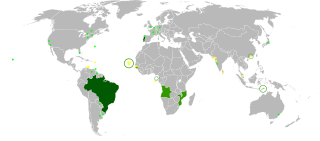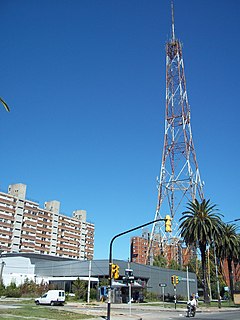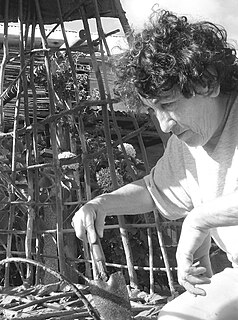
Uruguay, officially the Oriental Republic of Uruguay, is a country in the southeastern region of South America. It borders Argentina to its west and Brazil to its north and east, with the Río de la Plata to the south and the Atlantic Ocean to the southeast. Uruguay is home to an estimated 3.45 million people, of whom 1.8 million live in the metropolitan area of its capital and largest city, Montevideo. With an area of approximately 176,000 square kilometers (68,000 sq mi), Uruguay is geographically the second-smallest nation in South America, after Suriname.

This article deals with the diplomatic affairs, foreign policy and international relations of Uruguay. At the political level, these matters are officially handled by the Ministry of Foreign Relations, also known as Cancillería, which answers to the President. The Minister of Foreign Relations, since March 2015, is Chancellor Rodolfo Nin Novoa.

Lusophones are an ethno-linguistic group of peoples and nations across the world that speak the Portuguese language. The Lusofonia, also known as the Lusophone World, is the corresponding community of Lusophone nations, which exist in Europe, the Americas, Africa, Asia, and Oceania. Lusophone nations make up more than 270 million people globally.
An education minister is a position in the governments of some countries responsible for dealing with educational matters. Where known, the government department, ministry, or agency that develops policy and delivers services relating to sports are listed; overseen by and responsible to the education minister. The first such ministry ever is considered to be the Commission of National Education founded in 1773 in the Polish–Lithuanian Commonwealth.

The Uruguayan Antarctic Institute is Uruguay's governmental agency to fund, organize, control and promote research on Antarctica according with the Antarctic Treaty System. It was founded by scientists, and is now managed by Uruguay's Ministries of Defense, Foreign Affairs and Education.

Armenia–Uruguay relations are foreign relations between Armenia and Uruguay. Uruguay, as a small South American nations hosts a large Armenian community for its size. The Armenian community in Uruguay totals approximately 16,000 people.

Greece–Uruguay relations are diplomatic relations between Greece and Uruguay. Both nations are members of the World Trade Organization.
Indian Uruguayans form a small expatriate community consisting mostly of businessmen, Indian employees of TCS and some Catholic nuns. As of January 2016, about 83 Indians hold permanent residency in Uruguay. A further 733 Indians reside in the country on long-term visas, most of whom are employed by TCS in Montevideo. A small number of Indians from the Gujarati and Sindhi communities work as importers and run retail outlets of Indian textiles and handicrafts in Uruguay.
Cinemateca Uruguaya is a non-profit cinematheque in Montevideo, Uruguay, established in 1952, that aims to support the cultural development of cinema, and of art in general. Since its inception, it has belonged to the International Federation of Film Archives (FIAF). It is also a founding member of the Latin American Coordinating Committee of Moving Image Archives (CLAIM), and advisory member of the Audiovisual and Film Institute of Uruguay (ICAU).
The Ministry of Education and Culture is a Cabinet position in the governments of several nations. In some nations the Ministry of Education and the Ministry of Culture are separate departments; in others, the Ministry of Education and Culture also includes Arts, Science, Sports, etc.
The Official Service of Broadcasting, Television and Entertainment is Uruguay's national public broadcasting organization, controlled by the Ministry of Education and Culture.

Indigenous peoples in Uruguay, or Native Uruguayans, are a very small share of the population.

Televisión Nacional Uruguay or TNU is an Uruguayan national television network owned by the Ministry of Education and Culture of Uruguay. The channel began broadcasting on June 19, 1963.

The Ministry of Education and Vocational Training (MEFP) is the department of the Government of Spain responsible for proposing and carrying out the government policy on education and vocational training, including all the teachings of the education system except university education, without prejudice to the competences of the National Sports Council in matters of sports education. Likewise, it is also the responsibility of this Department the promotion of cooperation actions and, in coordination with the Ministry of Foreign Affairs, the promotion of international relations in the field of non-university education.

autores.uy is an author's database, created and maintained by the Uruguayan chapter of Creative Commons, with the support and collaboration of the Biblioteca Nacional de Uruguay, the Biblioteca del Poder Legislativo de Uruguay and the National Museum of Visual Arts of Uruguay. It has been declared of cultural interest by the Ministry of Education and Culture of Uruguay. Its main goal is to provide information regarding the copyright status of Uruguayan authors to identify whose works are in the Public Domain, and to digitize and socialize those works. Likewise, the platform allows online access to written and visual works in the public domain.

Elvira Lacy Duarte Cardoso was a Uruguayan visual artist.
Gladys Afamado is a Uruguayan visual artist, engraver, and poet. A member of the Montevideo Engraving Club since 1954, she has contributed to many of its monthly editions and almanacs. She later ventured into different plastic artforms, and in recent years has been recognized for her work in digital art.
Marcia Collazo Ibáñez is a Uruguayan lawyer, teacher, and writer.
The Figari Award is given annually to visual artists from Uruguay in recognition of their careers. It was instituted in 1995 by the Central Bank of Uruguay, at the initiative of the then president of the institution, economist and sculptor Ricardo Pascale. Since 2010, the organization of the award has been in the charge of the Museo Figari, under the National Directorate of Culture (DNC) of the Ministry of Education and Culture (MEC).
María del Rosario González, known as Lalo Barrubia, is a Uruguayan writer, performer, and translator based in Malmö, Sweden.